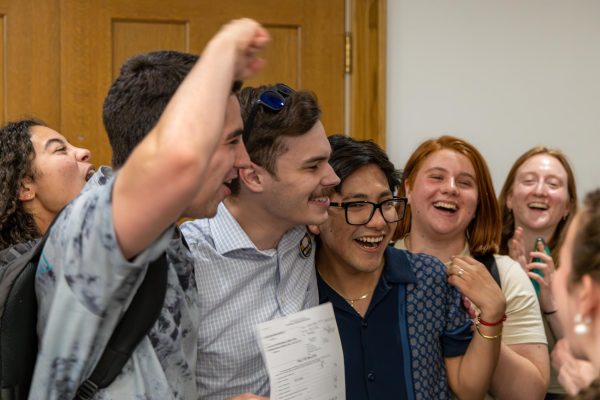The Georgetown Resident Assistant Coalition (GRAC), the organization that represents Georgetown University resident assistants (RAs) in collective bargaining negotiations, began its first round of negotiations with university officials Aug. 29.
The negotiations came after Georgetown RAs formally voted to unionize April 16, accepting representation from Local 153 of the Office of Professional Employees International Union (OPEIU). During these negotiations, RAs and the university discussed contractual proposals regarding scope, length and confidentiality.
Sam Lovell (CAS ’25), an RA in Copley Hall, said the RA union movement’s development from brainstorming ways to improve their working conditions to holding collective bargaining negotiations is an important advancement for RAs.
“We had this vision that was really just that, a vision, six months ago, and if you told us that we would be here in six months, I don’t think any RA would have believed you,” Lovell told The Hoya. “Today was the first day that we met, the very symbolic stage of ‘now we’re actually going to make some changes and improve on what we have to say.’”

A university spokesperson said the university is committed to working with RAs and OPEIU during contract negotiations.
“We deeply value the contributions of Resident Assistants (RAs) to our living and learning community,” a university spokesperson wrote to The Hoya. “Georgetown continues to work in good faith with OPEIU to negotiate a collective bargaining agreement.”
According to RAs present at the meeting, approximately 30 RAs attended at different points to support members’ bargaining and voice their opinions. OPEIU Local 153 officials are aiding GRAC in negotiating the new contract.
GRAC negotiators primarily proposed articles recognizing the RAs as parties of the contract, setting the length of the contract to two years and imposing a confidentiality agreement.
Lovell said the two sides made headway regarding recognition and confidentiality, yet could not reach a tentative agreement on the length of the contract, with the university proposing a four-year contract term and GRAC proposing a two-year term.
“It’s important that RAs are able to engage in this process,” Lovell said. “If we were to do it in four years, the next time there would be nobody from today that’s able to contribute to that, that knowledge and that process.”
Ulises Olea Tapia (SFS ’25), an RA in Village A, said GRAC is ready for a long bargaining process but hopes to achieve as much as possible in the next meeting.
“We’re happy to run a marathon if we need to, and that’s what we’re hoping for, a marathon of a meeting,” Olea Tapia told The Hoya. “I feel hopeful because I get to see my colleagues coming into the table and being excited to bargain.”
The RAs and Georgetown have not yet discussed RAs’ economic benefits or a potential termination process. While RAs who do not require financial aid receive free room and board worth approximately $20,000, RAs accepting financial aid get a reduced aid package — meaning their net benefits come out to as little as $1,000 per year, according to Olea Tapia.
Neil Thorley (SFS ’26), an RA in McCarthy Hall, said this compensation system is unfair to RAs who receive financial aid.
“When we talk about wanting to reform the compensation system, it’s not just a question of ‘we want more money, we want this, we want that,’ it’s ‘we want greater equality in the systems that already exist,’” Thorley told The Hoya. “We want RAs to be fairly and equally compensated for doing fair and equal work.”
“Why would you take on significant new responsibilities going into the next year if you know you’re not in fact going to receive any compensation?” Thorley added. “If you’re not going to get anything additional, why would you put yourself through what’s effectively 20 hours of work a week if you’re not going to be compensated for it?”
According to Lovell, RAs’ grievance process remains one of the main points of negotiations, as RAs’ violations used for termination included being late to meetings by a few minutes or having reasonable explanations for failing to do something in their job description.
Izzy Wagener (SFS ’26), an RA in Kennedy Hall, said that the RAs also hope to find agreement on accountability violations during these negotiations. According to Lovell, some RAs have faced consequences for being three minutes late to meetings or filing forms ten minutes late.
“It just felt like a lot of the work that we do was disregarded for very trivial mistakes,” Wagener told The Hoya.
David Hamer-Hodges, the organizing director for OPEIU Local 153, who was present for the negotiations, said that RAs deserve support for their work.
“More and more RAs and other student workers across the country are going to organize because every worker deserves a voice, and the work that these people do is incredibly difficult, incredibly important and not very easily replaced,” Hamer-Hodges told The Hoya. “You cannot just go find somebody. You cannot put a Craigslist ad out there and get somebody to do this work.”
Lovell said bargaining will continue until both Georgetown and the RAs are satisfied with their contract.
“All of our proposals are reasonable — ambitious, some of them, perhaps — but reasonable,” Lovell said. “But we haven’t notched any changes yet. Until we ratify a contract, whenever that date might be, everything that we’ve agreed to is just that — it’s an idea, it’s a proposal, but it’s not set in stone.”
Olea Tapia said the RAs’ calls for better working conditions reflect their goal of ensuring all students feel supported at Georgetown.
“I think that our job is a very important job,” Olea Tapia said. “We love our job. That’s why we’re doing this, because we love our job and we love supporting our residents so much that we want to see ourselves being supported just as much.”
GRAC and the university will resume negotiations Sept. 26.